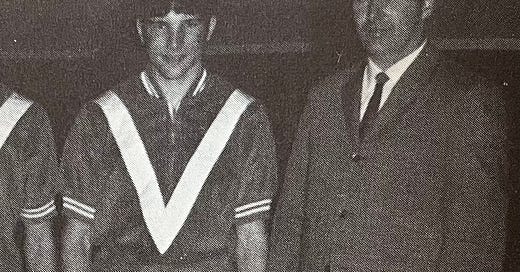Who we are is a complex question. We are made up of a number of factors; one of the most significant are the influence of certain people in our lives. There may be no better way to influence someone than to hold a position as a coach. To many, an athletic coach is a person from whom they learned the ways of the game, developed skills, and shared mutual dramatic or thrilling experiences. As in all matters of life, there are levels of coaches—from mediocre to great. A best coach for me was Mr. Frank Virtue.
Coach Virtue was the head basketball coach for my team at Franklin High School in New Jersey. He had come up from Butler in the mid1960s early I his teaching career and had stayed here since.
He was a mild-mannered man, although he would have bursts of energetic temperament when things were getting out of hand on the basketball court. He would quickly calm down. He’d follow the game and score closely as would any good coach.
He was personable and friendly to all players, knowing each by name. He wanted to make sure that they played and achieved the best that they could do with their talent and their desire to develop their own skills. His amicable traits would not be obvious in the heat of the game, being overcome by the need to win or do the best that the team could do.
Coach Virtue’s best qualities, painting his “portrait in character,” was his close relationship with the players. Everyone liked him—he knew the game and how to bring the best skills out in each player with the idiosyncratic abilities that each of us have. He used us in the most fitting ways possible for each of our own facilities. And he wove these talents into the team as a whole.
Mr. Virtue was a highly religious man, holding his Christian faith and values in high regard and was not shy in witnessing for them; a true pedestrian minister who was always willing to let it be known how his Savior is always there for him and for others.
He spent many summers going to the poor areas of Appalachia to help the boys there, showing them how to play basketball on the rough courts that were available. Through this volunteering selfless effort he made for a positive influence on the lives of countless boys who might otherwise wander without a purpose in life.
As a guidance counselor he helped many a high school student understand the world and their place in it. More than one college bound fellow, including myself, realized their potential and what they could make of it. He helped guide some friends to places that would be best for them, and they gave back as well, for example, by going with him to Appalachia to help others and also becoming a teacher.
Today, after sixty or so years in teaching, Mr. Virtue can see the result of the many players who came through his programs and as students who passed through his office. Those same kids have kept in touch with “Coach” and display the same respect for him now. In fact, perhaps more. respect as they have considered all the correct choices they made due, in part, to the influence he had on their lives. And like the tours of Appalachia, he, and a pupil or two, imparted some of the same warm regard to the kids in the mountains.
Scores of his players still gather round to talk about their days of ball, the times since, and experiences gained—and this while including our Coach Virtue in the conversations. He is not only a vital part but an enthusiastic participant.
Whether state champions, players in top colleges like Connecticut, or a star who had gone to the NBA, Coach has given each of them the same respect, the same funny jokes and smiles, as he does for me—a bumbling no-name basketball player on a last place team.
These are the factors that make up a best coach, and an exemplar Profile in Character.





